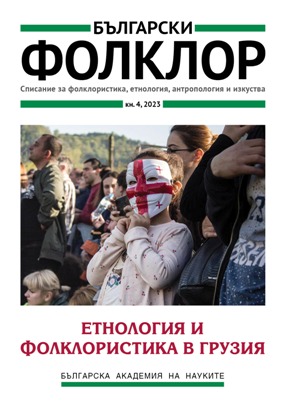Грузинските народни поговорки и афоризмите на Шота Руставели
Georgian Folk Proverbs and Shota Rustaveli’s Aphorisms
Author(s): Lia KarichashviliSubject(s): History, Anthropology, Social Sciences, Language and Literature Studies, Literary Texts, Cultural history, Semiotics / Semiology, Customs / Folklore, Poetry, Theoretical Linguistics, Studies of Literature, Sociology, Ethnohistory, History of ideas, Social history, Semantics, Cultural Anthropology / Ethnology, Culture and social structure , Social development, Social differentiation, Sociology of Culture, Philology, Social Norms / Social Control, Theory of Literature, Identity of Collectives, Georgian literature
Published by: Институт за етнология и фолклористика с Етнографски музей при БАН
Keywords: folk proverbs; the Knight in the Panther’s Skin; aphorisms
Summary/Abstract: Folklore is regarded as one of the sources of Shota Rustaveli’s worldview. The folk wisdom was reflected in the Knight in the Panther’s Skin as emanation of the national consciousness and being and, at the same time, general cultural paradigms that occur in the literature of various nations. In Rustaveli’s narrative the folk wisdom is frequently accompanied formula “it is said” that emphasizes old age of the idea, its oral widespread nature and anonymity. Many Rustaveli’s aphorisms are very close to the folk proverbs with their ideas though they are formulated with Rustaveli’s eloquence. The semantic and stylistic closeness of Rustavelian aphorisms and folk proverbs evidences that along with the brilliant education of his time, Rustaveli had deep folk wisdom. It is due to this reason that the source of some aphorisms is folk sayings. At the same time, a number of Rustaveli‘s aphorisms became the basis of folk saying.
Journal: Български фолклор
- Issue Year: XLIX/2023
- Issue No: 4
- Page Range: 597-614
- Page Count: 18
- Language: Bulgarian
- Content File-PDF

